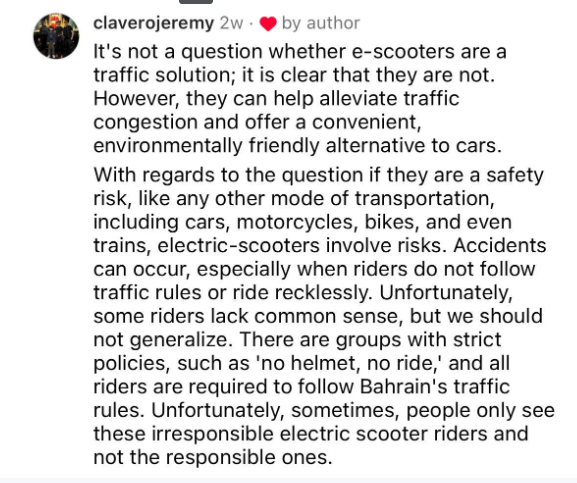Can Bahrain’s roads handle e-scooter boom?
TDT | Manama
The Daily Tribune – www.newsofbahrain.com
Email: ashen@newsobahrain.com
The number of electric scooters, or e-scooters, on Bahrain’s roads is steadily increasing, with growing concerns among drivers about the safety of riders. E-scooters have become a common sight in areas like Juffair, Manama, Tubli, and Muharraq, particularly during the evening when many residents use them for transportation.
This trend is driven by affordability, with prices ranging from BD100 to BD 300, depending on quality, and readily available in major supermarkets.
While e-scooters offer an affordable and eco-friendly mode of transport, the increasing number of riders has raised concerns about road safety and pedestrian walkways being dominated by e-scooters.
Jeremy Clavero, founder of the Bahrain Electric Scooter Team, emphasised the need for dedicated lanes but acknowledged the challenges.
“Sharing the road with cars is inevitable in the absence of proper infrastructure,” Clavero told The Daily Tribune. To mitigate risks, Clavero advocates for clear protocols, traffic calming measures, and promoting shared paths with cyclists and pedestrians as temporary solutions.
“Late-night riding can also significantly reduce the risk of accidents, as traffic is much lighter,” he added. E-scooters are becoming increasingly popular among expatriates in Bahrain, and their environmental benefits are being recognised.
Clavero highlighted that his team supports Bahrain’s Sustainable Development Goals (SDGs), particularly SDG 7 (Affordable and Clean Energy), SDG 11 (Sustainable Cities and Communities), SDG 12 (Responsible Consumption and Production), and SDG 13 (Climate Action). “E-scooters reduce carbon footprints and help lower the number of cars on the road,” he said.
Environmental initiatives Bahrain Electric Scooter Team has also been actively involved in environmental initiatives like tree planting and beach clean-ups, demonstrating their commitment to SDG 13 (Climate Action).
When asked about safety measures for e-scooter riders, Clavero emphasised the importance of wearing helmets and safety gear, especially at night.
“Promoting responsible riding habits can significantly reduce accidents,” he stressed, adding that the group enforces strict rules for its members, with penalties for rule violations.
With increasing popularity, there is also discussion about adapting European-style regulations for e-scooters in Bahrain. However, Clavero noted that any regulations must consider Bahrain’s unique infrastructure and driving habits.
Supporting Bahrain’s SDGs Kareem Hassan, Executive Director of the United Nations ESCWA Technology Centre, also weighed in on the potential of e-scooters to support Bahrain’s SDGs.
“The rise of e-scooters aligns with SDG 11: Sustainable Cities and Communities, and SDG 13: Climate Action,” Hassan said. He added that they promote healthier lifestyles, reduce carbon emissions, and alleviate urban congestion.
For Bahrain to fully capitalise on the benefits of e-scooters, infrastructure development — such as dedicated lanes and safety measures — will be crucial.
“By supporting this trend and implementing appropriate infrastructure, Bahrain can continue to work towards achieving its environmental and urban development goals,” Hassan added.
Kareem Hassan, Executive Director of the United Nations ESCWA
Jeremy Clavero, founder of the Bahrain Electric Scooter Team
Readers' comments online about e-scooters
Readers' comments online about e-scooters
Related Posts





